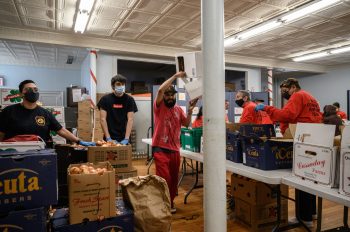Troops often lack basic financial training
TEXT OF STORY
TESS VIGELAND: As if our soldiers don’t have enough to deal with fighting wars in Iraq and Afghanistan, many also face personal finance challenges that threaten their economic security. Some enter the military without knowing even the basics, like how to manage a budget. But other hurdles could trip up even the savviest financial planner. Marketplace’s Jeff Tyler takes us to a California National Guard base where they’re trying to help.
JEFF TYLER: Helicopter pilots practice taking off and landing here at the Joint Forces Training Base at Los Alamitos. The military is all about specialization. But while young recruits learn to aim missiles with pinpoint accuracy, they suffer from too little practice keeping their personal finances on target. That was the case for Marco Velez.
Marco Velez: When I first joined the Army, I didn’t know how to write a check. I got my first bank account when I joined. So I’m in line at basic training at the PX. The lady had to tell me at the cash register how to write out a check.
Now he’s a contractor with the California National Guard, where he educates service members about available benefits.
Cheryl Courtright works with him at the Family Readiness Program. She says some obstacles are cultural. For example, if the male bread-winner exclusively handles the finances, Courtright says the family can be lost when he ships overseas.
Cheryl Courtright: We’ve had it where we’ve literally had to walk a family through — “This is what a check is. There’s money in a bank. This is where your bank is. This is the balance. This is how you read your bank statements.”
Courtright also counsels young enlisted guys, offering a boot camp for budgeting.
Courtright: You have a new baby. What’s the priorities here? Do you need that flat-screen TV? Or do you need to make sure that the baby’s got a crib, formula, diapers and food?
The personal finance challenges are very different for reservists and National Guard. These folks are typically older. And many have good paying civilian jobs. Courtright knows from experience. She had to reassess her own financial priorities when her husband was activated.
Courtright: He made more money at that point in the civilian world than he did in the National Guard.
Jerry Newberry with the Veterans of Foreign Wars, or VFW, says it’s a common challenge for National Guard and reservists.
Jerry Newberry: That steady stream of income falls dramatically. Someone who’s earning 50- or 60-thousand dollars a year is all of a sudden earning less than 20.
The situation can be especially tough on small-business owners. Again, Marco Velez.
Velez: My friend, Scott, he used to be part of an air-conditioning company. And he got activated. And he ended up losing half his business because of that. He was making six figures a year. And then when he got activated he was only making, uh, maybe 45.
On top of that, service members face various bureaucratic black holes. Paperwork might not get processed, so new troops could go a month or two without a paycheck. The VFW’s Jerry Newberry cites one particularly egregious catch-22. It happened to a National Guard unit from Minnesota, which had been deployed overseas longer than any other unit.
Newberry: In the entire military. These people were deployed for just short of two years. And one day short of being able to obtain education benefits from the military, from the government. One day short.
Other times, troops may be eligible for certain benefits, but they don’t know it. Marco Velez touts an Army program.
Velez: Active duty Army has a savings program, where if a soldier saves ten-thousand dollars, they’ll match 10 percent. That’s a free grand.
Other grass-roots organizations also offer help. The VFW got more than a million bucks from tool company Vermont American to fund a financial assistance program called Unmet Needs.
In Orange County, Habitat for Humanity is testing a pilot program. Cheryl Courtright says Habitat is building 13 homes specifically designed for disabled vets, and available with zero-percent loans.
Courtright: I don’t know wherever else they can find a zero-percent-interest loan to help disabled soldiers and veterans. It’s an amazing program.
Despite these opportunities, soldiers can be their own worst financial enemies. They’re often too proud to ask for help, or wait until it’s too late. Plus, unsophisticated service members face dangerous domestic predators, falling prey to expensive life insurance rip-offs and other scams.
Coming off a helicopter and dodging bullets, the last thing a soldier needs is the added stress of worrying about bankruptcy.
I’m Jeff Tyler for Marketplace Money.
There’s a lot happening in the world. Through it all, Marketplace is here for you.
You rely on Marketplace to break down the world’s events and tell you how it affects you in a fact-based, approachable way. We rely on your financial support to keep making that possible.
Your donation today powers the independent journalism that you rely on. For just $5/month, you can help sustain Marketplace so we can keep reporting on the things that matter to you.


















